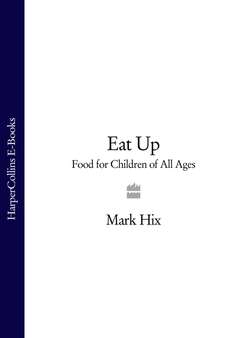Читать книгу Eat Up: Food for Children of All Ages - Mark Hix - Страница 17
First Foods
ОглавлениеUntil babies are four months old, their digestive system is not ready to cope with anything except milk and they don’t have the necessary muscle control to swallow solid food. From four months, they begin to let their parents know that they are ready for solids. If your baby is drinking a lot of milk but still seems hungry all the time, it is probably time to introduce a little baby rice at one feed. This is similar in taste to the milk your baby is used to, and is rich in iron and vitamins.
Baby rice is a single-grain cereal, which means that if your baby has an allergic reaction to it you will know that rice is the cause. If you begin with a mixed-grain cereal, or a fruit and rice cereal, you won’t be able to identify which element has triggered a reaction. Mix the baby rice to a semi-liquid consistency with breast milk, formula milk or cooled boiled water. One teaspoon of rice mixed with three teaspoons of liquid should be enough to begin with. Many parents don’t get through a single box of baby rice before their babies are on to more exciting flavours, so don’t stock up on too much of it.
Once your baby is familiar with rice, it is time to introduce the more interesting flavours of vegetable and fruit purées. Because babies naturally like sweet things anyway, it is a good idea to start them off on the savoury taste of vegetable purées, and save fruit until a bit later. Purées made from fresh ingredients have a stronger, more distinctive flavour than commercial baby food and, if they are properly cooked, contain nutrients that are frequently lost in processing. I find the one exception to fresh vegetables is the humble pea, which is better cooked from frozen. Home-made purées are much cheaper than jars of food, and you can make a batch in advance and then freeze it in tiny portions in ice-cube trays. The cubes can then be thawed in minutes when you need them.
It is best to treat the introduction of solids as a fun experiment initially. Be prepared for lots of mess and don’t expect your baby to eat very much. These early tastes are more about education than nutrition. Your baby should continue to drink the same amount of milk, which will still be the main source of nourishment.
It is not a good idea to give babies their first taste of solids when they are hungry. They don’t know what is happening when they feel a spoon being put into their mouth, since they are used to a continuous flow of milk and have no idea how to use their mouths to eat in a different way. Making them learn this when they are anxious to be fed is a recipe for disaster, so take the edge off their hunger by giving them their usual milk first.
Use a tiny shallow plastic spoon which will be soft on your baby’s gums and don’t put it too far into the mouth. Babies know how to suck and swallow, so if you place the spoon to their lips they can suck the food into their mouth, taste it and swallow it.
Don’t force your baby to eat. If they are not hungry or just not ready for solids, they won’t respond. Take no for an answer and leave it at that. If eating starts out as a difficult experience, it may stay that way. However, if you introduce a new food and your baby does not like the taste, don’t give up on it entirely. Try it again a week or so later and you may well get a much more enthusiastic response. Something else they do like eating is probably providing any missing nutrients especially if your baby is still drinking breastmilk or formula. As long as your baby is healthy, happy and growing, you can safely assume that all is well.
Babies’ body language tells us a lot about how hungry they are and whether they like something. When babies are hungry they appear excited by waving their hands, kicking their feet and leaning forward to open their mouths. If they are not hungry they close their mouths and turn their heads away, or fall asleep.
Babies lose more water than adults and need to be kept well hydrated, especially if they are ill. Don’t be tempted to give them sugary drinks. It will encourage a taste for sweet things that might make them difficult to feed later on and if they have any teeth the sugar could damage them. Milk, plus water from the age of about eight months, is all they need.
